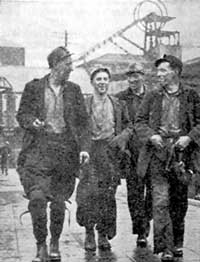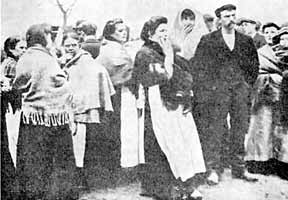|
Loading
|
|
|

National Coal Strike
"Are you in favour of giving notice to establish the principle of a minimum wage for every man and boy working underground in the mines of Great Britain?"
Ballot paper issued by the Miners' Federation of Great Britain, January 1912.
 The
National Coal Strike of 1912 was a direct consequence of the complicated wage
structure which had evolved in the mining industry by the end of the nineteenth
century. The old system of paying miners on the basis of a `sliding scale',
relating wages directly to the selling price of coal, was largely abandoned in
the late 1890's and the collier's money calculated in terms of the local
"price-list", negotiated district by district between the Federation
"Lodge" and the owners, plus a percentage agreed by a Conciliation
Board under an independent chairman. These price-lists took account of the
"cutting price", or standard rate per ton "got" from the
face, and "measured-up" for other work, such as repairing timber or
clearing "dirt", which was not directly productive. In most pits there
was an additional "consideration" paid, often unofficially, for work
in "abnormal places", places where variations in the seam, soft roof,
water, occurrence of stone, etc., etc., made it impossible for a collier,
however skilled, to earn a fair day's wage. Where these allowances were not
fixed in the price-list, he was responsible for his own claim. Frequently
managements allowed only small fixed sums to cover all claims, decisions between
man and man were purely arbitrary and the small number of men involved from pit
to pit led to easy victimisation. In 1910-11, 30,000 Welsh colliers struck over
the issue and the struggle developed into a fight for a minimum day wage for all
colliers. The M.F.G.B., attempting to negotiate nationally for the first time,
would at first only sponsor the proposed minimum for "abnormal
places", but in October 1911 resolved in conference "to take immediate
steps to secure an individual district minimum wage for all men and boys working
in the mines . . . without any references to the places being abnormal".
Individual districts prepared schedules of minimum rates for each of the various
grades of labour, Nottinghamshire, with Yorkshire, asking the top rate of 8s.
for hewers and the Federation officially conceding a demand of 7s. 6d. The
owners rejected the proposals almost unanimously, although most were now
prepared to guarantee "abnormal places". The New Year opened "in
anxiety and gloom" and in a national ballot well over half the M.F.G.B.
membership voted for a stoppage.
The
National Coal Strike of 1912 was a direct consequence of the complicated wage
structure which had evolved in the mining industry by the end of the nineteenth
century. The old system of paying miners on the basis of a `sliding scale',
relating wages directly to the selling price of coal, was largely abandoned in
the late 1890's and the collier's money calculated in terms of the local
"price-list", negotiated district by district between the Federation
"Lodge" and the owners, plus a percentage agreed by a Conciliation
Board under an independent chairman. These price-lists took account of the
"cutting price", or standard rate per ton "got" from the
face, and "measured-up" for other work, such as repairing timber or
clearing "dirt", which was not directly productive. In most pits there
was an additional "consideration" paid, often unofficially, for work
in "abnormal places", places where variations in the seam, soft roof,
water, occurrence of stone, etc., etc., made it impossible for a collier,
however skilled, to earn a fair day's wage. Where these allowances were not
fixed in the price-list, he was responsible for his own claim. Frequently
managements allowed only small fixed sums to cover all claims, decisions between
man and man were purely arbitrary and the small number of men involved from pit
to pit led to easy victimisation. In 1910-11, 30,000 Welsh colliers struck over
the issue and the struggle developed into a fight for a minimum day wage for all
colliers. The M.F.G.B., attempting to negotiate nationally for the first time,
would at first only sponsor the proposed minimum for "abnormal
places", but in October 1911 resolved in conference "to take immediate
steps to secure an individual district minimum wage for all men and boys working
in the mines . . . without any references to the places being abnormal".
Individual districts prepared schedules of minimum rates for each of the various
grades of labour, Nottinghamshire, with Yorkshire, asking the top rate of 8s.
for hewers and the Federation officially conceding a demand of 7s. 6d. The
owners rejected the proposals almost unanimously, although most were now
prepared to guarantee "abnormal places". The New Year opened "in
anxiety and gloom" and in a national ballot well over half the M.F.G.B.
membership voted for a stoppage.
Despite government intervention, and to national dismay, the strike began at the end of February. The strike opened at Alfreton in Derbyshire, one of the best conducted pits in the country, and spread slowly as local notices expired. `At the great majority of the Nottinghamshire collieries', it was reported on the first day, `the notices expire tomorrow, and at a few of the pits on Wednesday.
`At the collieries of Messrs Barber, Walker & Co. of Eastwood, where 3,000 men are employed, the miners have agreed to remain at work on Thursday. They have also acceded to the request of the managers to leave their tools and stock in the pit in the event of a stoppage'. The miners generally left work in a holiday mood, a fact which was quickly noted and exploited by the predominantly right wing press. In some localities, including Nottinghamshire `next to Derbyshire, the wealthiest district in the country' (and perhaps because, `according to a prominent manager', `over production would have compelled a stoppage of many pits early in March in any case') masters and men remained on good terms throughout the strike.
There was less confidence nationally. A civilian volunteer force was formed, police in the colliery districts generally were reinforced, and, as nerves began to fray towards the end of March, the army moved in.
Strike pay for the colliers, ten shillings a week for full union members, began on Tuesday 5th March. By the 23rd the Notts Miners' Association had spent about £50,000 out of their total funds of £220,000 and it was estimated that the men `could last out at least another ten weeks.' Meanwhile, miners' families, the Times wrote, `are able to get along on their savings and strike pay. They are mostly on short commons, but real privation is confined to a few homes where the breadwinner, through arrears of contributions, had depleted himself of strike benefit. Payment of rent for colliery cottages ceased when the strike began, and the companies do not press for it, knowing from past experience that the debts will be discharged in full.' But there was less `on strap'.
Minnie: `He gave me five shillings.'Luther : `Tha could ha' had what things ter wanted on strap.'
The Daughter-in-Law
All in all, by Monday, 25th March, `although during the week-end meetings were held in Nottinghamshire at which determined opposition was manifested to the Government Bill, there was evidence of a strong disposition on the part of the men to return to work at an early date, leaving details to be afterwards settled.'
The strike ended uncertainly, and with continuing dissatisfaction among many miners, shortly before Easter. The minimum Wage Act, passed as the price of peace, conceded the principle for which the Federation had fought, although in insisting on district settlements, the owners successfully qualified their victory.
"O God, Who art the Father of all, and Who alone makest man to be of one mind in a house, we beseech Thee, at this time of strife and unrest, to grant to us, by the inspiration of Thy Holy Spirit, a fuller realisation of our brotherhood man with man in Thee; allay all danger and bitterness, and deepen in us a sense of truth and equity in our dealings one with another, for the sake of Thy Son our Lord Jesus Christ, Amen".
Prayer for use in all Churches issued by the Archbishops of Canterbury and York on the eve of the National Coal Strike, 1912.
January-April 1912
from The Annual Register, 1912
January
1) The official list of New Year Honours. 3) At Melbourne, in the Second Test Match, the M.C.C. beat Australia by eight wickets.
6) The total value of foreign trade of Great Britain in 1911 a record figure.
8) Severe snowstorms in Western Scotland, the North of England, and North Wales.
10) The King and Queen left India after their Coronation as Emperor and Empress.
At the Central Criminal Court, Emily Wilding Davison, a suffragist, was sentenced to six months' imprisonment for attempting to destroy the contents of Post Office letterboxes.
16) Settlement of the cotton trade dispute.
17) At Adelaide, in the Third Test Match, the M.C.C. beat Australia by seven wickets.
18) Miners' ballot on the question of a strike for the minimum wage.
Heavy snowfall in the North and Midlands, and storms on the North and East coasts.
19) In the King's Bench Division, an appeal against the refusal of the magistrates of Cornwall to convict a man for cruelty to a stranded whale near Penzance was dismissed on the ground that the whale was not in captivity.
24) Bicentenary celebration in Berlin of the birth of Frederick the Great. The Emperor delivered an address.
February
6) The King and Queen attended a thanksgiving service at St. Paul's Cathedral for their safe return from India.
12) Formal abdication of the Manchu dynasty and end of the Chinese Empire.
14) At Melbourne, the M.C.C. beat Australia in the Fourth Test Match by an innings and 225 runs.
15) Opening of Parliament.
26) The coal strike began (at Alfreton, Derbyshire).
March
1) Suffragist window-breaking in the West End of London.
At Sydney, the M.C.C. beat Australia in the final Test Match by seventy runs.
4) Further window-breaking by Suffragists.
5) Reduction of railway services through the coal strike.
18-24) Strike in London of 1,200 taxicab drivers.
19) The Minimum Wage Bill introduced. 30) Presentation to King George V of the "Georges' gift" subscribed for by subjects bearing the name of George, of a badge of the Order of the Garter studded with diamonds.
In the Oxford and Cambridge Boat Race, rowed in a strong wind, both boats became waterlogged; Cambridge sank . . the Oxford crew emptied their boat and proceeded; the umpire decided it was no race.
31) Home Rule demonstration in Dublin; 100,000 present.
April
1) Captain Scott's ship Terra Nova arrived at Akaroa, N.Z., with news of the Antarctic expedition.
9) Great demonstration against Home Rule in Belfast.
11) Introduction of the Home Rule Bill. Final close of the coal strike.
15-16) Sinking of the Titanic.
16) First appearance of the Daily Herald, a new London Labour organ.